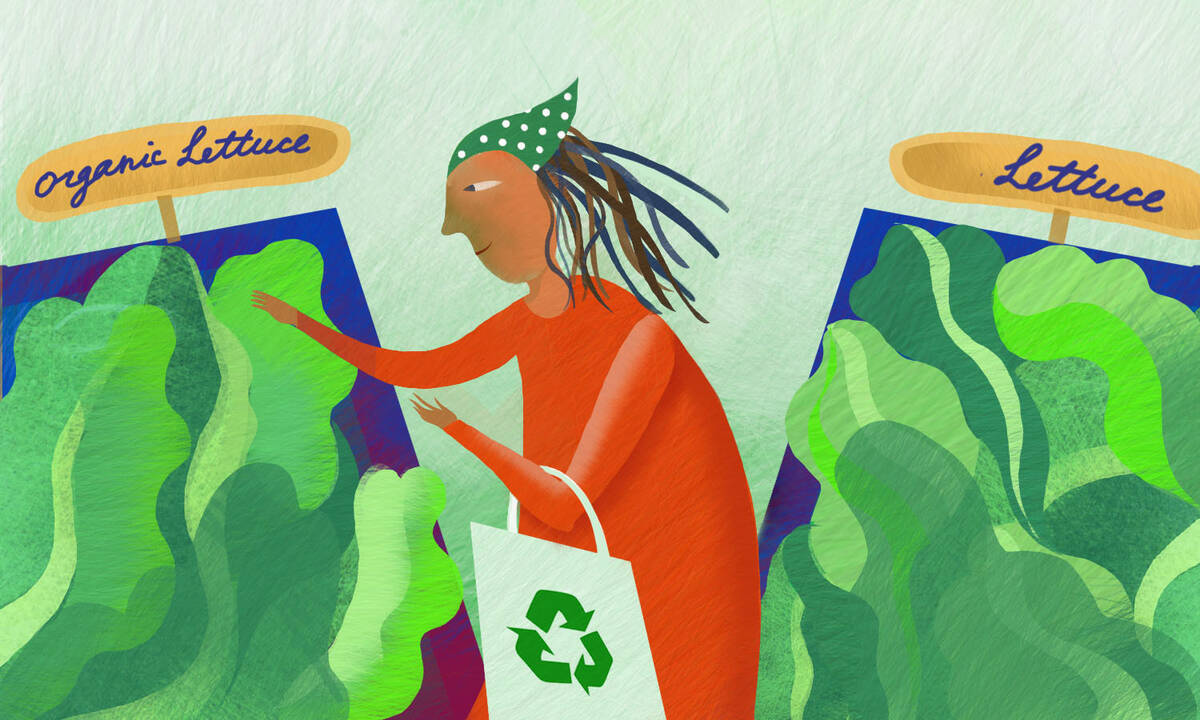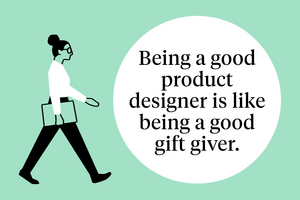Marketing Oct 4, 2021
Yes, Consumers Care if Your Product Is Ethical
New research shows that morality matters—but it’s in the eye of the beholder.

Yevgenia Nayberg
Do consumers care about morality when making purchasing decisions?
Marketing experts have hotly debated this question for years, without arriving at a clear conclusion. Some studies—along with the ever-expanding selection of eco-friendly, fair-trade, and locally made products—would indicate that yes, people want to feel that the products they buy support their values. Yet a bevy of other studies say the opposite. Some researchers have even gone so far as to dismiss the idea of the ethical consumer as “little more than a myth.”
Jacob Teeny, an assistant professor of marketing, was intrigued by the discrepancy—both as a scholar and as a consumer. “It’s always been very puzzling to me,” he says. So, in two recently published articles on the topic, he set out to answer the question once and for all.
In the first, a review of existing research on consumer morality, Teeny and colleagues Aviva Philipp-Muller and Richard E. Petty of The Ohio State University identify weaknesses in how previous studies assessed morality—weaknesses that they believe contribute to the conflicting findings. In the second, Teeny, Petty, and Andrew Luttrell of Ball State University experimentally test a new way of approaching consumer morality.
Together, these papers offer a clear takeaway: “Morality does matter,” Teeny says. “Consumers are consulting their ethical beliefs when they make purchasing decisions.” They just aren’t always interpreting morality in the same way as researchers.
Why “Organic” Doesn’t Necessarily Mean “Moral”
When Teeny and his colleagues reviewed previous studies on consumer morality, they noticed that many of them used what’s called an “attribute-level approach” to studying morality. That is, the researchers assumed that certain product attributes—for instance, being eco-friendly, locally manufactured, or cruelty-free—were universally considered moral by consumers. Under this approach, some studies found that consumers favored such products, concluding that morality matters. In contrast, other studies found that consumers weren’t any more likely to buy them and argued the opposite.
The problem, Teeny and his coauthors point out, is that not everyone sees these attributes as moral in the first place. When a consumer buys organic produce, it may be because they feel a sense of moral outrage over pesticides—or just because they believe it tastes better.
In other words, with an attribute-level approach, there’s no way to tell the difference between consumers who buy an “ethical” product for moral reasons or pragmatic ones. All you know is that they bought it. Similarly, there’s also no way to tell if a consumer is rejecting an “ethical” product because they don’t care about morality, or because they don’t view, say, animal testing as an ethical issue.
To address these challenges, other researchers favored what’s called a “person-level approach.” In these studies, researchers measured how much individuals care about morality in general, then looked at their purchasing habits, assuming that more morally guided people would be more likely to seek out ethical products.
“Positioning products in ways that are relevant to a consumer’s sense of morality has the potential to be an effective form of motivating consumer behavior.”
— Jacob Teeny
But this has pitfalls too, Teeny and his coauthors point out. Even among people who hold what’s called a “high morality identity,” certain types of products may not activate that sense of morality. For example, not buying pork is a moral issue for many Jews, but a non-Jew with a high moral identity likely doesn’t see pork as a moral issue in the first place.
Morality and Attitude
Is there a better approach, then? Teeny thinks so.
He and his colleagues advocate for a third approach that helps disentangle what consumers view as moral from what they like or dislike for unrelated reasons. This attitude-based approach makes it possible to figure out whether individual consumers are indeed weighing morality in their purchasing decisions, “because it helps us to identify what people view as a moral decision or not,” Teeny explains.
Teeny, Petty, and Luttrell put this “attitude-level approach” to the test in a series of experiments. In the first, they surveyed participants to report how positively they viewed four product categories (eco-friendly household cleaners, electric cars, fair-trade coffee, and American-made clothing). Then, they measured how much that positive attitude was a reflection of their moral beliefs.
The results showed that many people had positive attitudes toward these product categories; however, some reported that their positivity had nothing to do with their morality. Others reported that their positivity toward a product category was morally rooted. That group of consumers reported being much more likely to purchase something from that category in the future.
This correlational data was important, but Teeny and his colleagues wanted stronger evidence of morality’s effect on purchasing decisions. So they decided to experimentally manipulate whether or not people thought that their attitudes were rooted in morality.
Participants were asked to list their thoughts about eco-friendly cleaners, then told a computer would analyze what they’d written. (In actuality, no such analysis occurred.) The participants were randomly assigned to one of two groups: half were told the computer analysis revealed their views were based in morality, and the other half, that their views were based in practicality. Then, participants reported their intentions to buy eco-friendly cleaning products.
“What we find is that simply getting people to self-perceive their own attitudes about a product are based on morality leads them to be more likely to purchase it,” Teeny says. Another experiment established that the more moral a person perceived a product to be, the more likely they were to want to purchase it—regardless of how well the product was reviewed.
It all points to one conclusion: morality matters.
“This research shows that just like in every other aspect of people’s lives, morality is a strong influence on our behavior—even stronger than some of the other elements of our attitudes that have been previously shown to influence consumer behavior,” Teeny says.
That doesn’t mean morality always carries the day—sometimes the ethical option is difficult to obtain or more expensive than the consumer can afford. Teeny thinks more research can help to establish when, precisely, morality wins out and when it doesn’t. “I’m not claiming it’s the end-all, be-all, but consumers do consider it,” he says. “And I think both as consumers and corporations, we can work to develop that interest and desire and allow people to support morality with their dollars.”
Marketing on Morality
What does all this mean for companies? Consumers care about morality and reliably act on it.
“There is a hunger for consumers to be able to support their morality,” Teeny says. “And so positioning products in ways that are relevant to a consumer’s sense of morality has the potential to be an effective form of motivating consumer behavior. And sure, maybe it’s motivated by greed, but if it’s also getting these corporations to act more morally, then it’s a win–win.”
It’s not just fair-trade or local products that could benefit from morality oriented marketing, either: research shows people can hold morally based attitudes toward a wide array of seemingly unlikely products.
“You can moralize anything,” Teeny says. “There’s a funny paper about people who moralize refrigerators.” Consumer morality is constantly evolving, so it is important to learn how different consumer segments differentially moralize the same products or attributes. For example, today, people hold morally rooted attitudes toward plastic straws and grass-fed beef that might have been inconceivable 20 years ago.
“Society has changed, and new things have been moralized. And we’ll continue to see that,” Teeny says. “Having a more open mind to what constitutes morality, I think, can benefit both businesses and consumers.”
Susie Allen is a freelance writer in Chicago.
Luttrell, Andrew, Jacob Teeny, and Richard E. Petty. 2021. “Morality Matters in the Marketplace: The Role of Moral Metacognition on Consumer Purchasing.” Social Cognition.
Philipp-Muller, Aviva, Jacob D. Teeny, and Richard E. Petty. 2021. “Do Consumers Care About Morality?: A Review and Framework for Understanding Morality's Marketplace Influence.” Consumer Psychology Review. In press.



